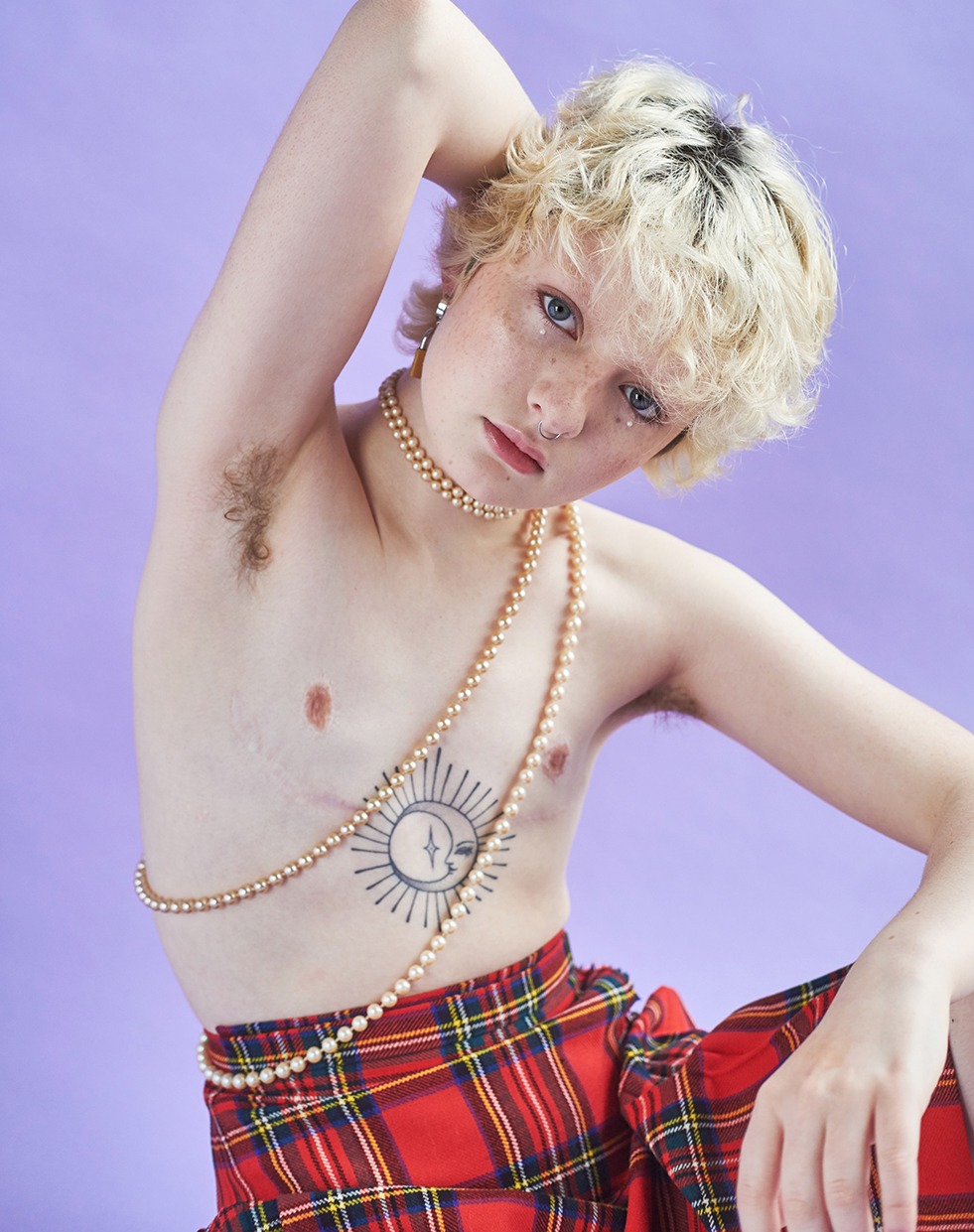Written by C Mandler.
Photos by Jillian Clark.
At 19, Lachlan Watson has cemented their place in Hollywood as not only a groundbreaking actor, but as an advocate and activist with a wicked sense of humor. While they spend their days breaking down the boundaries of gender on screen as one of the stars of the Netflix original series The Chilling Adventures of Sabrina, up until recently, Watson’s Instagram bio read, “Assigned Crocs At Birth.”
The impact they’ve made as a young, nonbinary actor playing a young, nonbinary character is indellible, but for Watson, it’s all in a days work. They grew up reading the works of other nonbinary icons, so, to them, trailblazing is simply contributing to the movement they’ve been part of since they were in their early teens. “It’s crazy to have articles be like, ‘youngest nonbinary actor,’” says Watson. “It doesn’t feel that way to me because it’s been such a big part of my life…. But I am right in that wave of people understanding that there really is an audience here who wants to see the stories that we’re telling.”
Watson told me I was only the second nonbinary journalist to ever speak with them, and we both had a moment of recognition, solidarity, and relief before the actual interview began. Chatting with Watson about their personal gender journey, being nonbinary in the public eye, and creating community wherever they go felt less like I was interviewing a celebrity and more like I was talking to a friend; someone who saw me.
Watson made a point of talking about a dislike of “being perceived,” but in the time of quarantine when so many LGBTQ+ folks are physically separated from people who understand and know them as they are, chatting with Watson was a special and much needed reminder that nonbinary people like us are still changing the world, even from our bedrooms.
The following has been condensed.
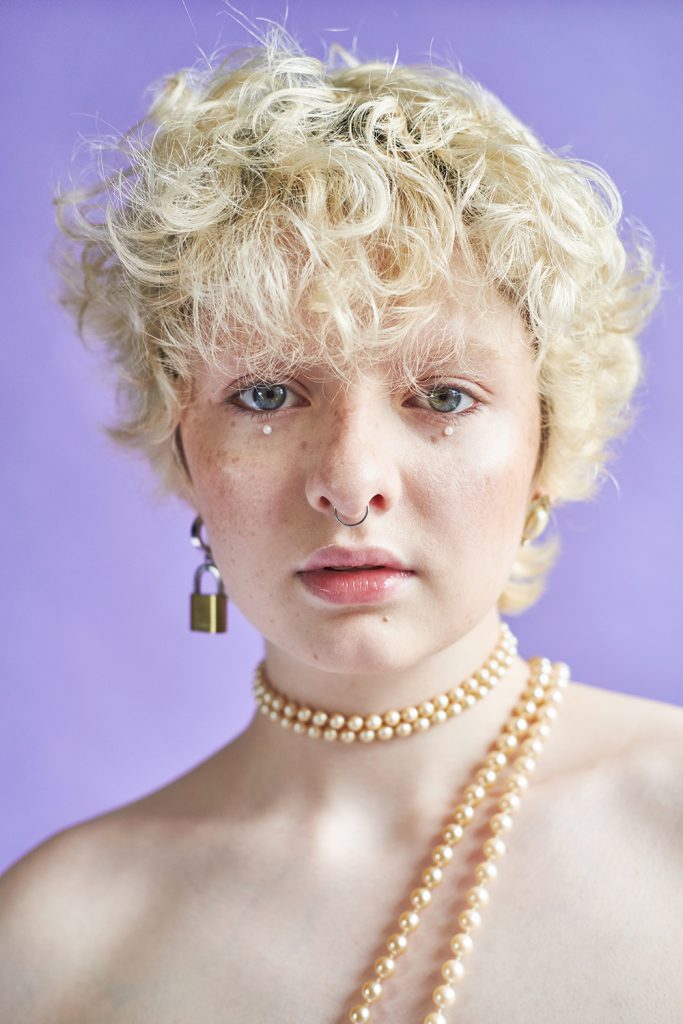
Can you walk me through your gender journey?
How much time do we have?! It might be overused and I kind of stole it from a friend of mine, but my gender feels like a weird, three-part opera. I came out when I was 13 as a little lesbian because I had a cute crush on my best friend. I was surrounded by all of these powerhouse queer people, but a lot of them were this very binary idea of being queer: a gay woman or a gay man. That was it.
Act Two was when I was 14 or 15. I took all the quizzes and looked at all the YouTube videos and was like, “Maybe I’m transgender,” so I came out as a trans male. I changed my pronouns and started wearing shoes that were three sizes too big, and I didn’t wear the color pink for two years. It felt better, but it still didn’t feel right. It felt like I was acting because I was putting on this character of who I thought I was supposed to be, as opposed to being who I actually think I was at the time.
It was like the wooden box with the shapes cut out, and you put the shapes in the right holes: I was a square peg trying to cut off pieces of myself to fit in the circle. I didn’t realize for a long time until I started looking into testosterone. I was like, “What if the box doesn’t exist?”
I had that realization at a good time: the box can be whatever I want. That’s when I read a lot of Jacob Tobia’s work about being nonbinary and came to this idea [that] I don’t feel like either — I kind of feel like both, and I don’t know what to do with that, so I just lived as me. I didn’t change my pronouns again; I don’t remember ever coming out as anything different. I remember devolving slowly into chaotic gender mode, and everyone around me went with me. I’ve performed so many genders in my life and now it feels like I’m not performing anymore.
That’s the thing that I always want to tell kids [who are] like, “I feel like I might be non binary, but I don’t know where to start.” Start by being you. Start by breaking down who you are and what you think you should be. I’ve always disagreed with the idea that coming out was a line. I feel like we should [say] more often that coming out is whatever you want it to be, and when you come out once, that doesn’t have to be it. Just because you liked Taylor Swift as a 13-year-old doesn’t mean you have to like her new album!
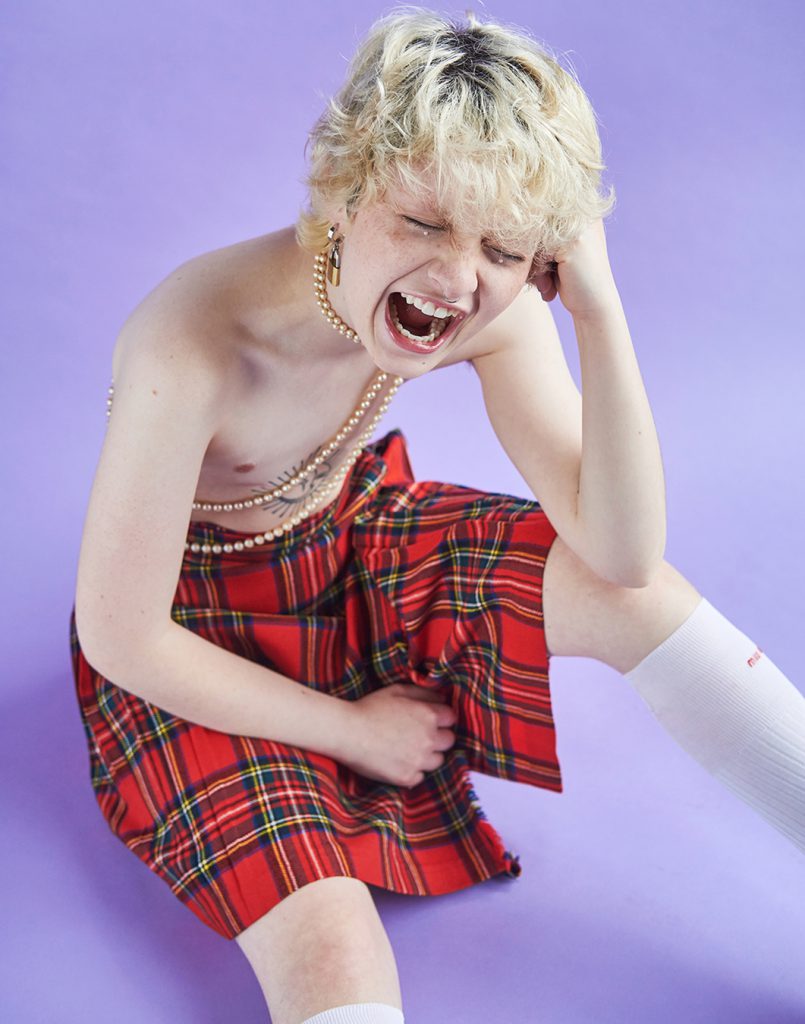
You have to learn quickly how to be enough for yourself and how to show up in spaces as you.
What’s it like being the youngest nonbinary person in a major television series?
It’s weird being a really specific brand of queer in a world where your existence and your identity is seen as very revolutionary and rebellious. You’re not surrounded by a lot of things that you relate to. It’s been a challenge, for sure.
It’s been interesting allowing myself to be a nonbinary actor in some spaces, but also allowing myself to just be an actor in others. You have to learn quickly how to be enough for yourself and show up in spaces as you. It’s a skill I’ve learned — how to be an authentic version of me, no matter what the space is. It’s weirdly difficult. There are a lot of things every queer person can relate to, like putting on a face, but you’re putting on the face for yourself as opposed to having other people put it on you.
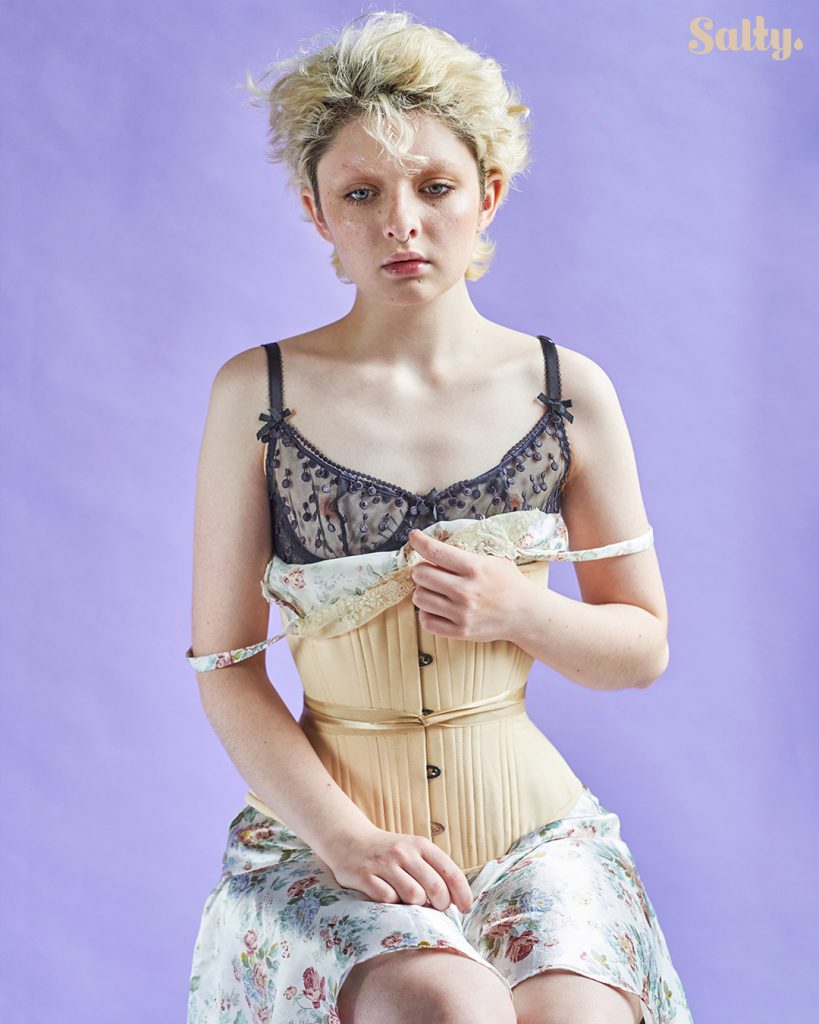
Do you feel like that representation for nonbinary people existed before you started acting, or do you feel like you’re at the frontlines of bringing it to fruition?
When I started out, there were like six of us, and now watching it grow is incredible. I came to understand the term “nonbinary” only two years before I went on Sabrina and played a trans, gender fluid kid. It’s crazy to have articles [call me] “youngest nonbinary actor.” It doesn’t feel that way because it’s been such a big part of my life, and I looked up to people like Jacob Tobia and Liv Hewson.
I feel like I live in a happy little queer bubble, so it gets burst when you’re like, “This is revolutionary to a lot of people.” It’s surreal, but it keeps me going. I’m doing this for a reason. To be riding the tidal wave of representation and getting DMs from kids who are like, “Wow, thank you for being a part of telling the story,” it’s felt incredible. I think we’re gonna change the world.
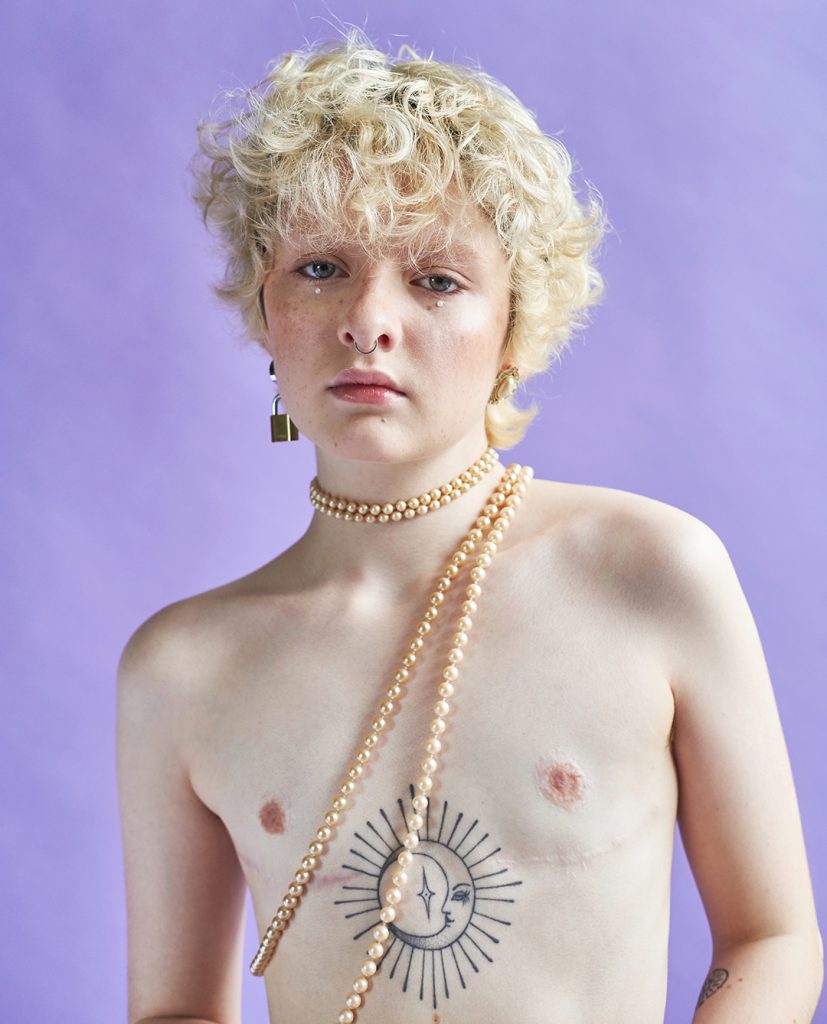
It’s weird being a really specific brand of queer in a world where your existence and your identity is seen as very revolutionary and rebellious. You’re not surrounded by a lot of things that you relate to.
Gender dysphoria and euphoria are such personal things. How do you navigate those feelings as a public figure?
Well, I delete Instagram a lot. I absolutely have crawling-under-the-bed moments where I don’t want to be perceived, and it’s hard to navigate in a field where your whole job is to be perceived. People have such an aggressive expectation of public figures. They almost see you as a character: you’re a fictional thing that doesn’t come or go, it just is. That’s not how people work.
Social media — having it be a 24-hour superstore of self-indulgent content — it’s changed things. We see it as such a necessary thing: “Oh, it’s for your career and you’ve got to check this all the time or else your career could go away,” which isn’t true but that’s the idea that we’ve built. At the same time, it levels out with the incredible platform it gives me. I wouldn’t be here if I hadn’t had the opportunity to build my own platform and be able to say the things that I want to say, and present my idea of myself unapologetically. So it’s a double-edged sword.
It’s getting back to the idea of waking up, doing what feels right for you, and appreciating the self that you’re in. That’s what makes me euphoric in the form of my gender; just having the space to be who I am.
How does the fashion industry approach dressing nonbinary people?
I expected it to suck a whole lot more than it did. I’m sure there’s a lot that goes on behind the curtain that would probably make me feel less than comfortable, but the experience that I had has been so shockingly effortless and comfortable. I did a photoshoot a little while ago with Givenchy where they were like, “We’re gonna send you the new collection. Put it on. It’ll be great.” They sent both the women’s and the menswear collection — I don’t even remember myself or my team having a conversation with them [about sending] multiple options. They were just like, “These are the things that will fit you. Have fun.”
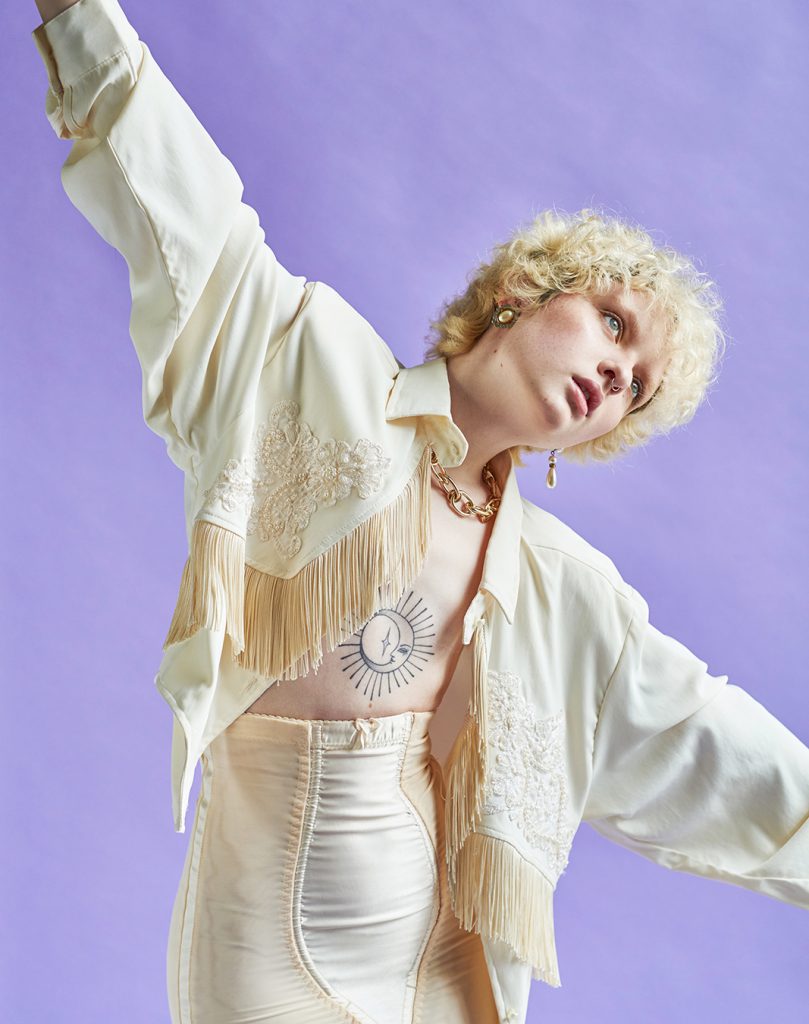
How do you think Hollywood’s attitude towards trans and gender nonconforming people has changed in the last few years and how has it impacted you?
My immediate reaction is it hasn’t changed at all. Then the more I [think] about it, look at all these rooms [I’ve] walked into and been accepted wholeheartedly. Look at all of these actors who are now getting cast. Look at that audition [I] sent in that was looking for a gender fluid character. So much has changed but, looking back on queer history, things happen so slowly that in the moment it’s hard to feel like you’re doing anything at all.
Looking back at te last two years, the fact that I’m getting personally requested for this role that has nothing to do with gender or this role that’s super female, but who cares, they’ll put me in a wig; the fact that I’m being accepted into those spaces at all means there’s been an insane amount of change. It’s good to get out of that queer bubble that’s like, “I’ve been doing this my whole life; I should be past this by now,” and realize this is still so new for so many people.
I think Hollywood will get there soon, but [there are] a lot of things that need to get broken down first, and a lot of people are not going to be happy about that. But to be inspiring nonbinary actors and to have nonbinary roles gives me hope that we will break down those barriers. It’s just a matter of time.
How have you been able to create community within those spaces that have been predominantly cishet?
It’s harder to accept a space without question[ing it], like, “Did I get cast in this because I relate to the story?” or “Am I only being invited on this panel because they want someone who can say this?” It’s easy to let yourself get into that narrative, telling yourself the same things that the world tells a lot of us anyway. It’s been hard to break out of that, but it’s taught me a hard and important lesson that even if I am here because of someone else’s idea of who I am, I’m still here. I can still be who I am in this space no matter the reason that I got invited. I can still take it and use it as what I want it to be.
So much has changed so quickly, but looking back on queer history, things happen so slowly that you’re in the moment, it’s hard to feel like you’re doing anything at all.
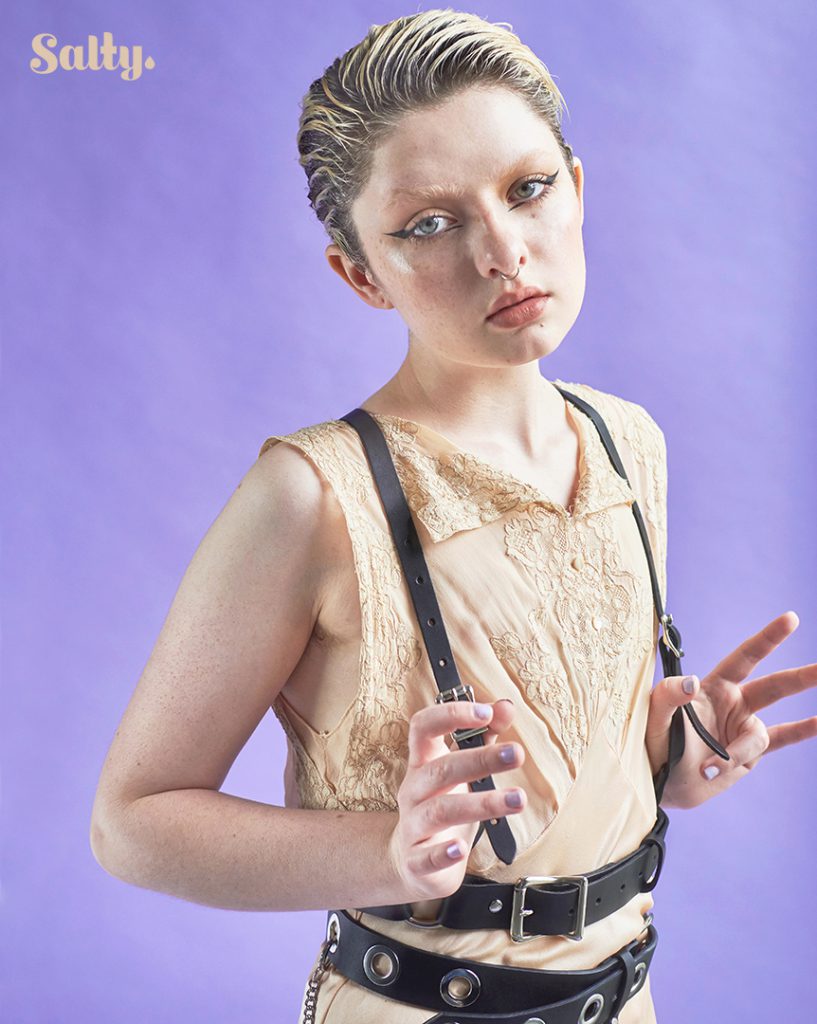
What’s it like dating as a young nonbinary pansexual person who is also in the public sphere? What advice do you have for young trans and nonbinary folks navigating dating?
How do you navigate the dating sphere? In my experience, you kind of just do. It’s learning and growing and listening to what people are telling you. That’s the biggest thing I’ve realized over the past two years.
When someone puts something on you, whether it’s being mildly famous or being a certain identity or sexuality, a hard lesson to learn is how to believe someone when they tell you how they feel. I didn’t believe people, and interpreted things the way I wanted to interpret things. The biggest lesson that I learned is sometimes people are just telling you the truth.
You have to listen and prioritize how those things make you feel because you can end up in situations where people are more in love with what they think you are, as opposed to who you actually are. That’s [something] that a lot of queer people can relate to. People want you to be someone you’re not, and finding the queer family who are willing to accept you as you are — those are things that shouldn’t be looked over so quickly. Those are the relationships that count.
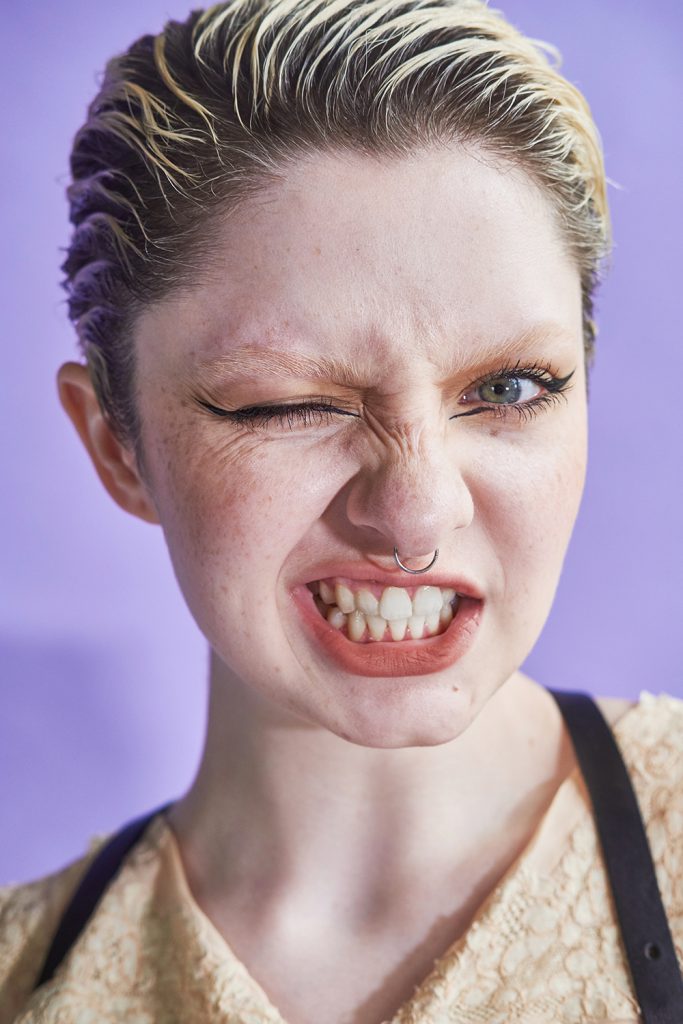
Fun question time: If you could spend an afternoon with anyone, living or dead, who would it be and why?
Tilda Swinton. Because she’s Tilda Swinton. Because I want to be Tilda Swinton.
What is your dream role?
Did you ever see The Witch with Anna Taylor-Joy? Anna Taylor-Joy plays this crazy witch girl who goes through this whole rigmarole, but it’s set in prairie town and she gets to run around naked and, like, be a witch. It’s baller. That was the first time I watched a movie and was like, “Oh my god, I want to play that.”
And where do you see yourself in 10 years?
On a beach in Hawaii wearing a sundress and a big hat because I have a week off between the role that I just played, which was an Edwardian pageboy who is trying to woo his mistress. And then I’m preparing for my next role, which is a witch lady in New York in the ‘80s.
Sounds rad. Is there anything important you want to share that you feel like you didn’t have a chance to say?
After all this time, you would think that I’d have my thoughts down in a more condensed manner than this, but I am proud to be my authentically chaotic and overwhelmingly worded self. And I hope it inspires other people to not limit their words either.
Follow Lachlan Watson on Instagram.
About the Author
C Mandler is an advocate, writer, and journalist born and raised in New York City. They are currently an Associate Producer at ABC News, where they try and expand the conversation around gender identity through their work in broadcast television. They are also a freelance writing focusing on issues of identity, mental health, and trauma, and will be pursuing their Master’s in Journalism in the fall with a focus on Arts and Culture.
Follow on IG: @c.mandler

